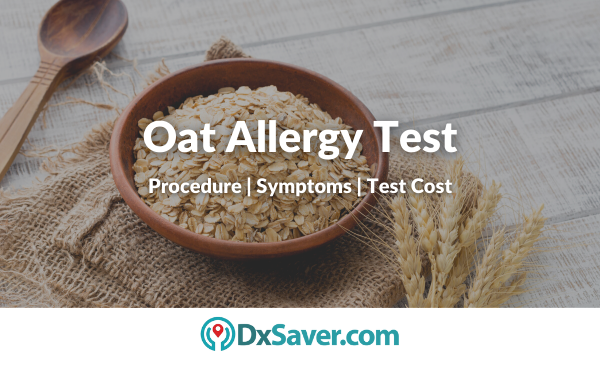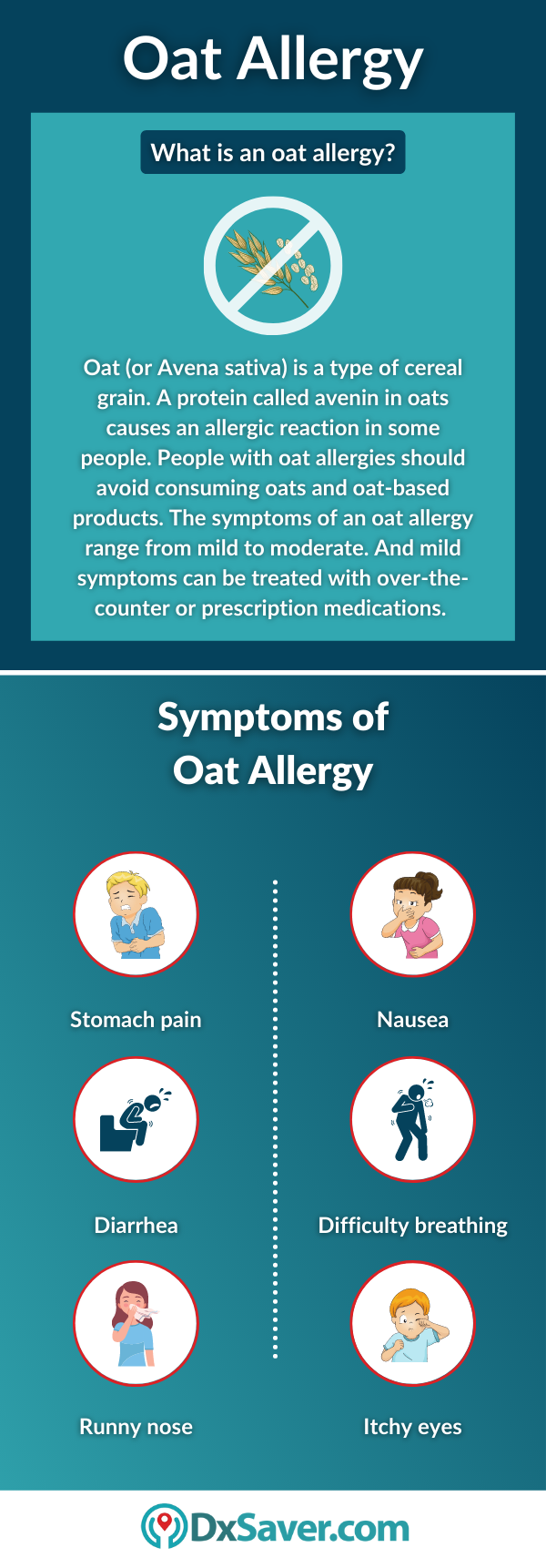
Oats are rich in nutrients, fiber, and omega-3 fatty acids that help the body and heart stay in optimum shape. Anyone can be allergic to oat but is rare in infants. Few people have an allergy to the proteins in oats, called avenins. And the oat allergy symptoms can range from mild to moderate. When you suspect that you have an oat allergy, you can consult an allergist. And they will carry out tests to diagnose it. Although oat allergy can’t be cured it can be managed with treatment. People with oat allergies should avoid consuming oats and oat-based products.
This article covers all the significant topics related to the oat allergy test such as the test cost, symptoms, treatment, and how to get tested for an oat allergy test.
- Oat allergy
- Symptoms of an oat allergy
- Oat allergy test
- Treatment for oat allergy
- What foods should I avoid if I have an allergy?
- Alternatives for oats
- Provider locations
For our readers who are interested in knowing the oat allergy test cost beforehand, we begin with that section.
How much does the oat allergy test cost?
Oat allergy test costs range around $49 in different labs and facilities across the US. Prior appointment isn’t required. You can order tests online by comparing the price or visiting the nearest lab during lab business hours. You will get the results in your email in 2 to 3 business days after completing the procedure. Apart from this, doctor consultation is available for any kind of further treatment or medical advice.
The table below shows the oat allergy test provider and their prices. You can know more and book the test by clicking on the “Book Now” button.
Name of our Partner Labs | Book Online at Offer Price |
HealthLabs
| $49 |
Oat allergy test cost with insurance
Many insurance companies in the U.S. cover all the vital tests like the oat allergy test. However, the coverage provided by private health insurance companies and national health insurance programs like Medicare varies widely. Most of the health insurance policies cover oat allergy test costs only once or twice a year and when your physician orders more than twice in a year, you should pay the test cost out of pocket. So, you are recommended to check if your health insurance policy covers the oat allergy test cost.
Our oat allergy testing providers do not accept any kind of health insurance policy. However, they can provide you with an itemized receipt containing all the details viz the name of the test, code of the test, and CPT code which is necessary for insurance reimbursement purposes.
Oat allergy
Oats (known as Avena sativa) is a whole-grain cereal that is commonly eaten for breakfast. A protein called avenin in oats causes an allergic reaction in some people. Both oat allergy & oat sensitivity can trigger an immune system response. Some people may experience symptoms after eating oats and it may not be allergic to oats at all, rather it may indicate gluten sensitivity or celiac disease. It is important to note that gluten is a protein found in wheat. And oats do not contain gluten, but they are often grown and processed in facilities that handle wheat, rye, and other substances that do contain gluten.
There is a difference between an oat allergy and an oat sensitivity. An allergy involves the immune system. And occurs when the immune system considers oat as harmful. Whereas oat sensitivity involves the digestive system. And occurs when you can’t properly digest oats.
Oat allergy symptoms
The symptoms of an oat allergy range from mild to moderate. And can affect the skin, gut, and airways. Symptoms of oat allergy may include:
- Blotchy, irritated, itchy skin
- Rash or skin irritation on and in the mouth
- Runny nose or nasal congestion
- Nausea
- Vomiting
- Diarrhea
- Stomach pain
- Difficulty breathing
- Scratchy throat
- Itchy eyes
Severe food allergies can lead to anaphylactic shock and it can be life-threatening if the person doesn’t receive immediate treatment. And the symptoms of anaphylactic shock usually appear within one hour of exposure. Symptoms of anaphylaxis may include:
- A sudden decrease in blood pressure
- A tight chest
- Wheezing
- Swollen tongue or throat
- Noisy breathing
- Dizziness or confusion
- Loss of consciousness or collapse

Oat allergy test
An allergist will recommend one of the following methods to diagnose oat allergy:
- Skin prick test: An allergist will place tiny amounts of allergens with histamine and glycerin or saline under the skin of your forearm to identify which ones generate a response.
- Blood test: An allergist will order a blood test when it is not possible to take a skin test.
- Oral food challenge: During this test you will be asked to ingest oats, in increasing amounts, to check if you have an allergic reaction. Oral food challenge should only be done in a medical facility, so you can be treated for serious allergic symptoms.
- Patch test: This patch test uses patches treated with allergens. And patches remain in place on the back or arm for two days to check if you have a delayed allergic reaction to oats.
- Elimination Diet: During this test, you will be asked to avoid oats for a week or more. When symptoms do improve, the person is likely allergic to oats.
Treatment for oat allergy
People with oat allergies should avoid consuming oats and oat-based products. Mild signs or symptoms can be treated with over-the-counter or prescription medications. An allergist may prescribe allergy medications like antihistamines to relieve mild symptoms. Inhaled corticosteroids can help in treating breathing problems and asthma symptoms. And in case of a skin reaction, topical corticosteroids may help. An allergist may also prescribe an epinephrine auto-injector, which delivers adrenaline to the body. As severe reactions can happen at any time, you need to be prepared for them. And it’s essential to carry an epinephrine auto-injector with you.
What foods should I avoid if I have an allergy?
When you are sensitive or allergic to avenin, you must avoid oats in what you eat and the products you use. To check for cross-contamination, you should check product labels words like oats, oat powder, avenin, and phrases like might contain oats or manufactured in a facility that uses oat ingredients.
Other things to avoid may include:
- Oat bread
- Oat bran
- Muesli
- Granola and granola bars
- Oatmeal
- Porridge
- Oat cookies
- Oatcake
- Flapjacks containing oat flour
- Oat milk or any hot beverage containing oat milk
Apart from this, some beers can also contain oats, so make sure to check with the provider before consuming. And some creams and moisturizers may also contain oat proteins. So, when you have an oat allergy you need to avoid topical products containing oats, such as certain cosmetics or oatmeal baths.
Alternatives for oats
As people with oat allergies should avoid oats and oat-based products, they can replace them with other cereals and grains. It may include sorghum, rice, millet, corn, and polenta. And there are many other replacements for oat-based breakfast meals.
Provider locations
An oat allergy test can be done at any of our partner’s 4500+ labs located across the US. To know the oat allergy test cost, refer to the first section of the article.
Frequently Asked Questions
What is an oat allergy?
An oat allergy is a reaction of the immune system to proteins found in oats. Symptoms can range from mild to severe, including hives, itching, swelling, and difficulty breathing.
How common is an oat allergy?
Oat allergies are considered to be relatively uncommon, with estimates suggesting that less than 1% of people have this allergy.
What are the symptoms of an oat allergy?
Symptoms of an oat allergy can include hives, itching, swelling, and difficulty breathing. In severe cases, anaphylaxis may occur.
Can an oat allergy be diagnosed?
An oat allergy can be diagnosed by a doctor or allergist through a skin prick test or a blood test.
Can oat allergy be treated?
The best way to treat an oat allergy is to avoid eating oats and products containing oats. In some cases, a doctor may prescribe antihistamines or epinephrine to help manage symptoms.
Other topics you may also be interested in:-
- What is Food Sensitivity?
- Nut Allergy: Causes, Symptoms, Risk Factor, Testing and Treatment
- Shellfish Allergy Test – Causes, Symptoms, and Treatment of Shellfish Allergy
- Lactose Intolerance Test: Types and Symptoms of Lactose Intolerance
- Importance of Aldosterone to Renin Ratio
- What is a Titer Test?
- Top 10 Foods/Diet for Weight Loss
- Symptoms of Gluten Intolerance
- Vitamin D Test Cost
- Causes and Symptoms of Zika Virus
- What is a Triiodothyronine Test? – Purpose, Procedure, and Test Cost
- Glucose Blood Test: Purpose, Procedure and Test Results
- Prolactin Test Cost in the U.S.
- Cost of Stool Culture Test in the U.S.
- What is MMA Fighter Blood Test?
- Cost of Amylase Test in the U.S.
- How much does the Lipase Test Cost in the U.S?
- Fibrinogen Test Cost in the U.S.
- C-Peptide Normal Levels, Test Results & Treatment





